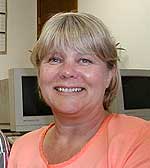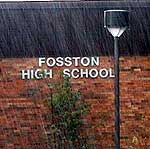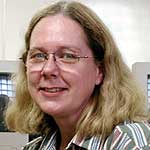By Bob Reha
Minnesota Public Radio
June 6, 2002
Fosston, in northwest Minnesota, is like many small towns. A farming community of 1,500 people, Fosston appears to be a quiet, almost tranquil town. But over the past five years the community has been shocked by a series of suicides. Across Minnesota there are hundreds of suicides each year. The most recent number for 1999 shows that 491 people took their lives. In Fosston, the deaths left people angry. Now they're taking action.
| |
|
|
|
||
The Fosston community first began losing teens in 1997.
"We had a total of six young men who died over the course of three years," says Bonnie Stewart.
Stewart is co-founder of The People Connection, Inc. Stewart organized the group after trying to help her children cope with the loss of friends and classmates. She discovered, locally, there was little help. She also found there are a lot of myths surrounding suicide.
"You know, when a suicide happens, (people say) 'If it was going to happen, it was going to happen. It couldn't have been prevented,'" Stewart says.
Stewart says depression is the leading cause of suicide. People are uncomfortable talking about depression and suicide. They want to deny it happens. There's no cure, but education and information are critical in preventing suicide, according to Stewart.
Funded by state and private grant money, People Connection, Inc. holds public forums and distributes pamphlets. The group has brought in experts to speak to the community. It's all having an effect.
"People are less afraid to talk about it than they used to be," Stewart says. "We can say the word 'suicide' now without trying to say something else. And the issue of depression as one of the leading causes, that has become easier to talk about in our community."
| |
|
|
|
||
People Connection workers say that's a big step in the right direction. Mary Laws, the program director, says people are now willing to talk about what's happened. People have a tendency to classify suicide victims as losers, mentally ill, drunks or dopers. Statistically the opposite is true, according to Laws.
"It's the well-liked, over-achiever, high school athlete- valedictorian type of kid," says Laws. "The one that you think is just all around All-American, and they're the ones most likely to do it."
But as the community learns more about preventing suicide, there's still an important question. Why so many suicides? And why in Fosston?
Pastor Lois Ball sits in her dining room and watches a thunderstorm drench her flowers.
"Every single one of these boys was loved dearly and so they weren't missing that," Ball says. "I don't know, I wish I did."
Ball lost her adult son to suicide nine years ago. Five years ago her 16-year old grandson took his own life. She gave up her job as a social worker to go back to school and become a pastor.
| |
|
|
|
||
Ball has also become involved with The People Connection. She's been trained in what's called the "QPR" program. It stands for "Question, Persuade and Referral."
The program is a first responders' course for suicide awareness, according to Ball. The program's motto is, "Ask a question, save a life." People are trained to recognize the symptoms of depression. Then, they know how to approach kids whose behavior indicates there might be a problem.
"You should always ask the question, 'Do you feel suicidal?'" Ball says. "Or, 'Do you want to take your life?' Or some way that they would respond to you. You can't ask it like, 'Well, you would never do that would you?' Because of course they're going to say no."
Ball will be going back to school this fall. She'll be training local teachers in the QPR program. She too, thinks things are changing for the better. People aren't just talking about the problem, Ball says, they're taking action. They've developed a task force. There's a new suicide response program in the local school.
When a local girl tried recently to commit suicide, support for the family was immediate. There were people who knew how to respond and help. Best of all, Ball says, the girl lived.
More from MPRMore Information



